Hyundai Kona vs Peugeot 408 - Differences and prices compared
Costs and Efficiency:
Price and efficiency are key factors when choosing a car – and this is often where the real differences emerge.
Hyundai Kona has a decisively advantage in terms of price – it starts at 23100 £, while the Peugeot 408 costs 35100 £. That’s a price difference of around 12060 £.
Fuel consumption also shows a difference: Peugeot 408 manages with 2.70 L and is therefore significantly more efficient than the Hyundai Kona with 4.60 L. The difference is about 1.90 L per 100 km.
In terms of energy consumption, the advantage goes to the Hyundai Kona: with 14.60 kWh per 100 km, it’s barely noticeable more efficient than the Peugeot 408 with 14.80 kWh. That’s a difference of about 0.20 kWh.
As for range, the Hyundai Kona performs a bit better – achieving up to 514 km, about 59 km more than the Peugeot 408.
Engine and Performance:
Power, torque and acceleration are the classic benchmarks for car enthusiasts – and here, some clear differences start to show.
When it comes to engine power, the Peugeot 408 has a barely noticeable edge – offering 225 HP compared to 218 HP. That’s roughly 7 HP more horsepower.
In acceleration from 0 to 100 km/h, the Peugeot 408 is minimal quicker – completing the sprint in 7.20 s, while the Hyundai Kona takes 7.80 s. That’s about 0.60 s faster.
In terms of top speed, the Peugeot 408 performs hardly perceptible better – reaching 233 km/h, while the Hyundai Kona tops out at 210 km/h. The difference is around 23 km/h.
There’s also a difference in torque: Peugeot 408 pulls clearly perceptible stronger with 360 Nm compared to 265 Nm. That’s about 95 Nm difference.
Space and Everyday Use:
Cabin size, boot volume and payload all play a role in everyday practicality. Here, comfort and flexibility make the difference.
Seats: offers more seating capacity – vs .
In curb weight, Hyundai Kona is slightly lighter – 1370 kg compared to 1544 kg. The difference is around 174 kg.
In terms of boot space, the Peugeot 408 offers a bit more room – 536 L compared to 466 L. That’s a difference of about 70 L.
In maximum load capacity, the Peugeot 408 performs to a small extent better – up to 1583 L, which is about 283 L more than the Hyundai Kona.
When it comes to payload, Hyundai Kona hardly perceptible takes the win – 490 kg compared to 456 kg. That’s a difference of about 34 kg.
Who wins the race?
The Peugeot 408 proves to be wins the duel decisively and therefore becomes our DriveDuel Champion!
Peugeot 408 is the better all-rounder in this comparison.
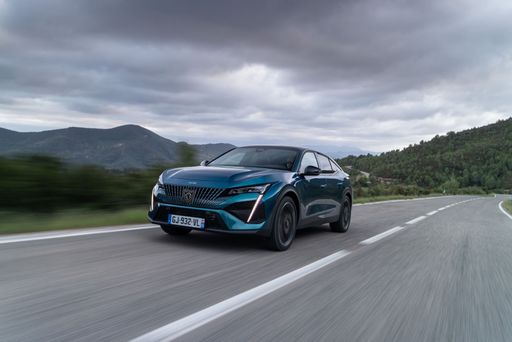 @ Peugeot / Stellantis Media
@ Peugeot / Stellantis Media
Peugeot 408
Costs and Consumption
View detailed analysis
Engine and Performance
View detailed analysis
Dimensions and Body
View detailed analysis
Hyundai Kona
The Hyundai Kona wears its personality on the outside with bold styling and sprightly handling that turns city driving into something a little more fun than a commute. It blends practical space, modern tech and sensible running costs into a compact, stylish package — a smart pick if you want flair without paying luxury prices.
details @ Hyundai Motor Company
@ Hyundai Motor Company
 @ Hyundai Motor Company
@ Hyundai Motor Company
 @ Hyundai Motor Company
@ Hyundai Motor Company
 @ Hyundai Motor Company
@ Hyundai Motor Company
Peugeot 408
The Peugeot 408 blends a coupe-like roofline with practical sensibility, delivering striking looks and a surprisingly airy, premium-feeling cabin. On the road it prefers comfort and poise over manic thrills, making it a smart, stylish choice for buyers who want something a bit different from the usual family hatchback.
details @ Peugeot / Stellantis Media
@ Peugeot / Stellantis Media
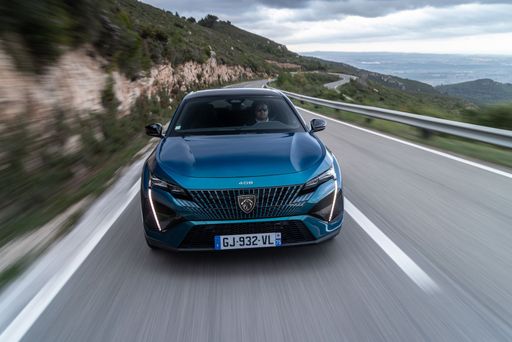 @ Peugeot / Stellantis Media
@ Peugeot / Stellantis Media
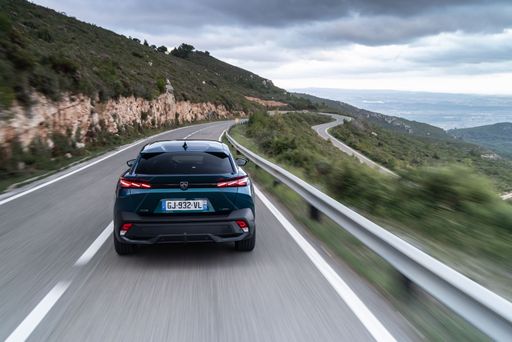 @ Peugeot / Stellantis Media
@ Peugeot / Stellantis Media
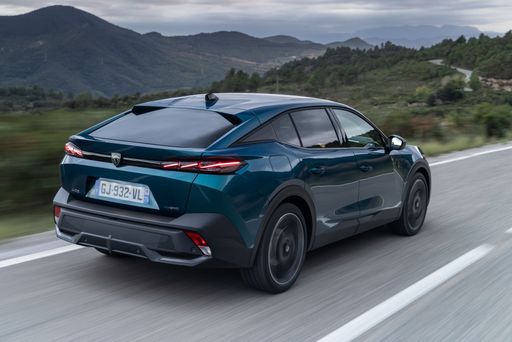 @ Peugeot / Stellantis Media
@ Peugeot / Stellantis Media
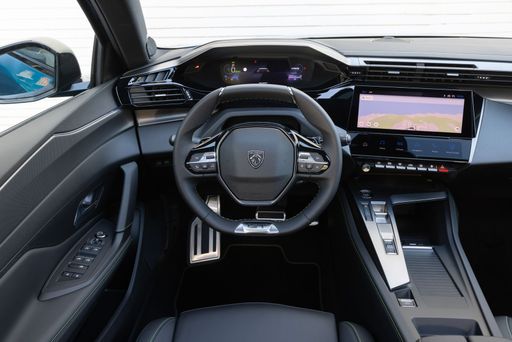 @ Peugeot / Stellantis Media
@ Peugeot / Stellantis Media
 @ Hyundai Motor Company
@ Hyundai Motor Company
|
 @ Peugeot / Stellantis Media
@ Peugeot / Stellantis Media
|
|
|
|
Costs and Consumption |
|
|---|---|
|
Price
23100 - 41600 £
|
Price
35100 - 48000 £
|
|
Consumption L/100km
4.6 - 7 L
|
Consumption L/100km
2.7 - 5.1 L
|
|
Consumption kWh/100km
14.6 - 16.8 kWh
|
Consumption kWh/100km
14.80 kWh
|
|
Electric Range
377 - 514 km
|
Electric Range
79 - 455 km
|
|
Battery Capacity
1.3 - 65.4 kWh
|
Battery Capacity
58.20 kWh
|
|
co2
0 - 163 g/km
|
co2
0 - 114 g/km
|
|
Fuel tank capacity
38 - 47 L
|
Fuel tank capacity
42 - 52 L
|
Dimensions and Body |
|
|---|---|
|
Body Type
SUV
|
Body Type
SUV
|
|
Seats
5
|
Seats
5
|
|
Doors
5
|
Doors
5
|
|
Curb weight
1370 - 1773 kg
|
Curb weight
1544 - 1879 kg
|
|
Trunk capacity
466 L
|
Trunk capacity
471 - 536 L
|
|
Length
4350 - 4385 mm
|
Length
4687 mm
|
|
Width
1825 mm
|
Width
1848 mm
|
|
Height
1580 - 1585 mm
|
Height
1478 mm
|
|
Max trunk capacity
1300 L
|
Max trunk capacity
1528 - 1583 L
|
|
Payload
420 - 490 kg
|
Payload
371 - 456 kg
|
Engine and Performance |
|
|---|---|
|
Engine Type
Electric, Petrol, Full Hybrid
|
Engine Type
Electric, Petrol MHEV, Plugin Hybrid
|
|
Transmission
Automatic, Manuel
|
Transmission
Automatic
|
|
Transmission Detail
Reduction Gearbox, Manual Gearbox, Dual-Clutch Automatic
|
Transmission Detail
Reduction Gearbox, Dual-Clutch Automatic
|
|
Drive Type
Front-Wheel Drive, All-Wheel Drive
|
Drive Type
Front-Wheel Drive
|
|
Power HP
115 - 218 HP
|
Power HP
145 - 225 HP
|
|
Acceleration 0-100km/h
7.8 - 11.9 s
|
Acceleration 0-100km/h
7.2 - 9.4 s
|
|
Max Speed
162 - 210 km/h
|
Max Speed
160 - 233 km/h
|
|
Torque
200 - 265 Nm
|
Torque
230 - 360 Nm
|
|
Number of Cylinders
3 - 4
|
Number of Cylinders
4
|
|
Power kW
85 - 160 kW
|
Power kW
107 - 165 kW
|
|
Engine capacity
998 - 1598 cm3
|
Engine capacity
1199 - 1598 cm3
|
General |
|
|---|---|
|
Model Year
2024 - 2025
|
Model Year
2024 - 2025
|
|
CO2 Efficiency Class
A, D, C, E, F
|
CO2 Efficiency Class
A, C, B
|
|
Brand
Hyundai
|
Brand
Peugeot
|
Is the Hyundai Kona offered with different drivetrains?
Available configurations include Front-Wheel Drive or All-Wheel Drive.
The prices and data displayed are estimates based on German list prices and may vary by country. This information is not legally binding.
